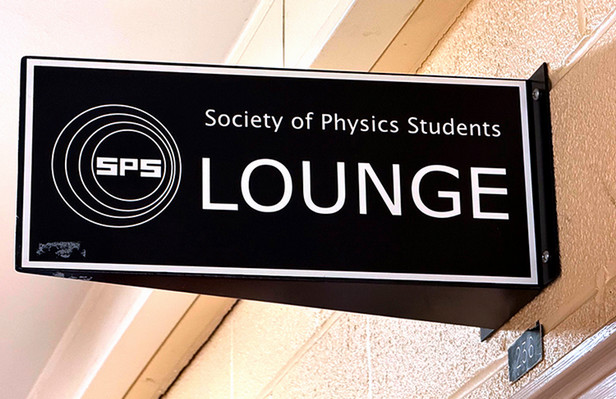
Purdue Society of Physics Students
From first steps to final strides: A freshman and senior's journey in the world of Purdue physics
Story by David Siple
Physics is often considered one of the most challenging subjects in academia. A student organization at Purdue works diligently to ensure that students eager to explore the mysteries of the universe do not have to do it alone. The Society of Physics Students (SPS) is a national organization committed to building a strong community among physics students while offering resources, networking opportunities, and tools for professional development. The Purdue chapter of SPS brings these goals to campus, creating an environment where students passionate about physics can connect, collaborate, and grow.
As Purdue SPS President, Lauren Bell, a senior in Applied Physics Honors and Mathematics with minors in Computer Science and Economics and a certificate in Quantum Information, Sciences, and Technology (QIST), explains, “We want to help students become better connected with their peers and the wider community within the department.” The organization promotes engagement among students, faculty, and the larger physics community. By hosting events for faculty and students and providing professional development opportunities, SPS supports its members in developing vital skills and connections. In collaboration with the physics department, the organization ensures that students have the required support and resources to excel academically and professionally.
SPS at Purdue is a vital link between students and the physics community more broadly, helping them navigate their academic and professional journeys. Through academic support, game nights, research collaborations, and outreach events, SPS is committed to making Purdue students feel at home for anyone interested in physics. “We host several events in collaboration with clubs like the Purdue Astronomy Club (PAC), Math Club, Quantum Student Organization (QSO), and Gender Minorities in Physics (GMiP) where members from any club are welcome to participate,” says Bell.
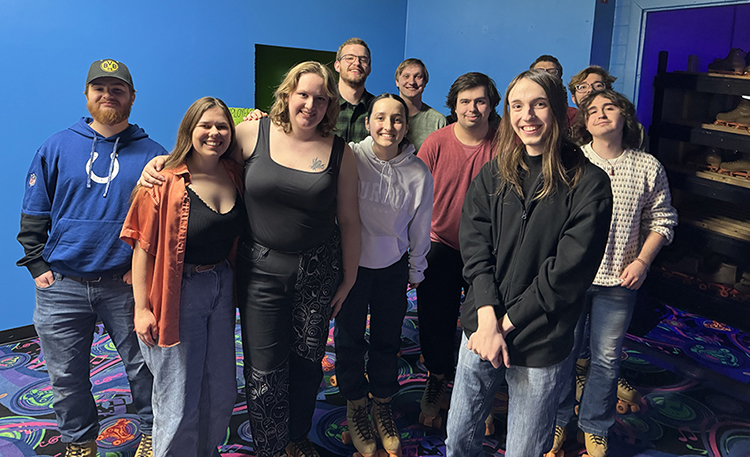
For many students, joining SPS is about finding a sense of belonging. Adina Margineantu, a freshman majoring in physics, described the club as a crucial support system. "SPS is a physics club at Purdue, but it's so much more than that. It brings together the physics community by giving us a place to get to know each other and hang out," she said. "There's also the SPS lounge in the physics building, which is a great place to relax between classes, talk to people, or buy a snack. Whenever I'm having a hard time in my classes, SPS and its members will be there to support me."
Margineantu has been fascinated by physics since she was quite young. She read books on astronomy and astrophysics, and she fell in love with thinking about the world in new ways. "I love math, which closely supports physics, so I knew that I had to pursue a career in physics. I like research and the pursuit of discovering new ideas, and it felt like physics and science were the culmination of everything I was interested in. I chose Purdue because of the wide range of research opportunities here."
The lounge, located in the physics building (PHYS 236), is a quiet study area, but it is also a hub for students to socialize, work on assignments, and seek academic help. Mason Giacchetti, a senior double majoring in physics and mathematics, spoke about the welcoming nature of the organization. "All students are welcome to participate in SPS. One of our major goals is to provide a friendly space for people interested in physics to engage with one another, explore this interest together, or just socialize," he said
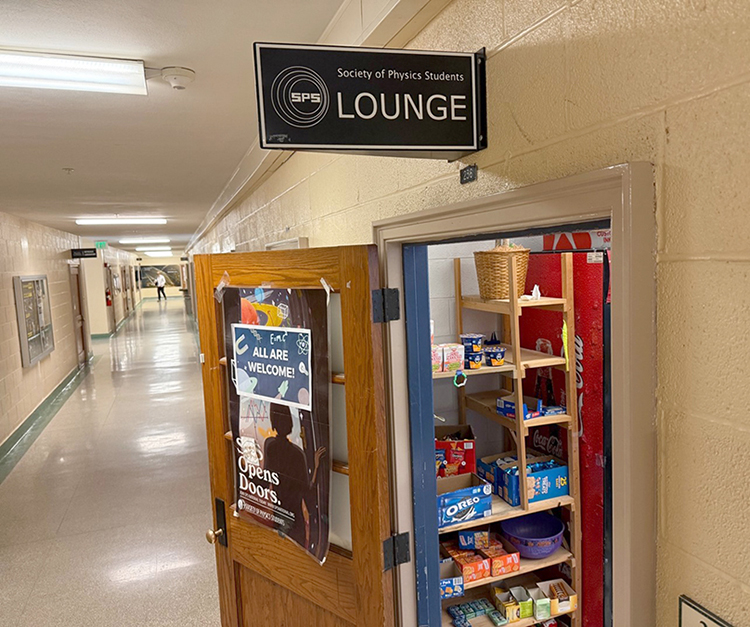
The Society of Physics Students Lounge in PHYS 236. (Photo Courtesy/David Siple)
Giacchetti has been a member of the SPS since his sophomore year and an active member in leadership within the group since he was a junior. His interest in physics began a little later in high school when he took calculus. He credits his teachers who helped him discover his passion in physics and math. However, learning about these subjects didn't end when he left the classroom. "I also began learning more about different topics in physics on my own time through watching things such as lectures at the Royal Institute online," says Giacchetti. "This content helped to further encourage my interest in physics as I wanted to learn more about the seemingly magical stuff that I was learning through this content. I chose physics as my major when I applied to college, and I haven't looked back since."
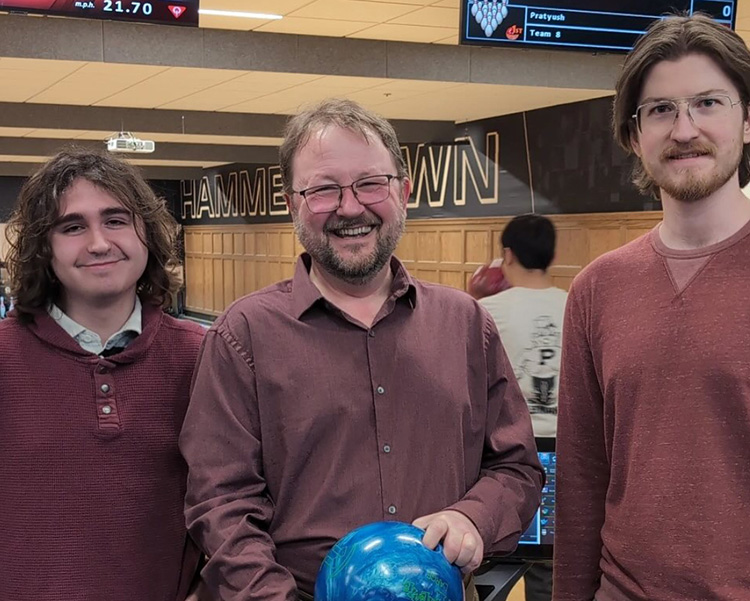
SPS is known for its engaging events and activities, which help students take a break from their rigorous coursework. Among the most popular events are weekly game nights on Saturdays, where members come together to play board games, card games, and video games. "Almost all of our active members have attended game nights at some point," Giacchetti shared. "It's a staple of our organization and a great way for students to unwind. We give all our members opportunities to meet with others to achieve this, and we have always been extremely welcoming and open with these events to ensure that all our members feel like they belong."
Another fantastic SPS tradition is the Professor Dinner nights, where students share a meal with Purdue physics faculty and learn more about their research and careers. "The monthly professor dinners are a great place to get to know faculty and ask them any questions about themselves," says Margineantu. Giacchetti also appreciates these dinners because it "gives students a chance to learn about specific research being conducted here at Purdue and the people behind it," he says.

Professor Dinner Night with Professor Nolte and Professor Pyrak-Nolte (Photo Courtesy/SPS President Lauren Bell)
Seasonal outings also bring the group together in unique ways. "We have a yearly trip to a corn maze at Exploration Acres, which is always a hit," Giacchetti said. "Students get to enjoy the maze, eat great food, and just have fun away from campus." In the winter, the club organizes ice skating trips, and in the spring, they wrap up the year with a cookout.
While SPS is a great place to socialize, it also serves as an academic lifeline for students struggling with coursework. The club hosts study sessions before major physics exams and provides a network of upperclassmen eager to help younger students.
"In theme with trying to build a strong physics community among students here at Purdue, if students need help with coursework or class material, we provide resources for them to find other members who might be able to assist them, or we provide recommendations on how to get help," Giacchetti explained. " Apart from connecting members to help one another with coursework, for exams in the major classes (such as PHYS 172 or 272), we will host review sessions to help students prepare for these exams. We focus on connecting members so that they can help each other."
For Margineantu, the support of SPS members made all the difference when she encountered her first academic challenge at Purdue sharing a personal experience, "During my first month at Purdue, I was having trouble with a physics lab that required coding, so I walked into the physics lounge and asked the first person I saw for help (Grace Katz). It just happened that a python coding expert (Braden Garretson) was in the room, and I got told to work with him. Although I had almost never talked to these people before, they kindly helped me, and within 10 minutes, I was done with my lab. This day sticks out to me because it shows the nature of SPS so clearly: they are there to help and support other physics majors. Plus, it was the day I met my new friends."
SPS is also about giving back and pushing the boundaries of science. One of the club's biggest initiatives is the Faculty vs. Students Fundraiser. In this competition, students take on professors in physics-related challenges to raise money for the Techpoint Foundation for Youth, which is an Indiana-based organization that aims to provide STEM-based learning opportunities to underserved and underrepresented students within Indiana.
This will be the second time Purdue SPS hosts the event, and Giacchetti gives us a glimpse of this year's fundraiser, "We will be mixing up the style of the fundraiser this year so that students will compete against faculty in a set of chosen games. We are very excited about the second year of this fundraiser, and we are looking forward to April 18th."
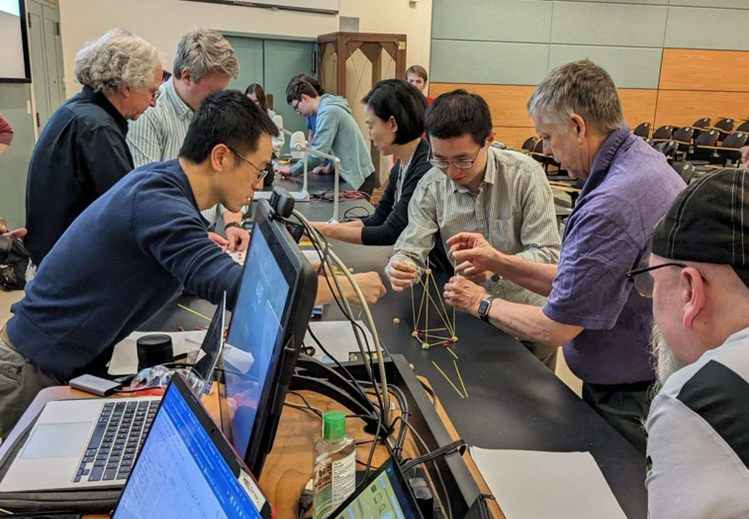
SPS Faculty vs. Student fundraising event. (Photo Courtesy/Jonathon Sullivan-Wood)
In addition to the Faculty vs. Students fundraising event, Giacchetti says the group is working on different projects to help improve the services SPS offers students. "We are interested in bringing back large projects that will allow our members to engage in physics-related research in an introductory and low-stress environment," explains Giacchetti. "The SPS at Purdue has led many such projects in the past (such as a motorized couch), and we feel like our members could benefit from having these projects again."
One of their larger goals is to create opportunities for members to engage with the physics community on a more professional level. One such opportunity might be a trip to the American Physical Society's March meeting or even to Fermilab, where members can learn about national labs and the work that gets done there.
The group considers many ideas, but these are the most significant. The SPS fundraiser remains a high priority. This initiative presents an opportunity for SPS to give back that unites faculty and students. By expanding the fundraiser, SPS aims to enhance its impact and further strengthen the physics community at Purdue. Giacchetti says, "These are some of the many ideas that we have been discussing in order to improve the SPS, and we look forward to being able to turn these dreams into reality."
If you're on the fence about joining SPS, Giacchetti and Margineantu have the same advice: go for it!
"We understand completely that it can be intimidating to join organizations such as ours, especially if you are not a physics major and if you don't know anyone in the club," says Giacchetti. "However, the SPS offers enormous benefits both on a personal and professional level, so don't be afraid to try it out. Everyone is very friendly and understanding, so there is no pressure whatsoever. Exploration is a huge component of self-discovery, and you never know how big of an impact the SPS can have on you until you give it a shot. Don't be afraid to just go for it!"
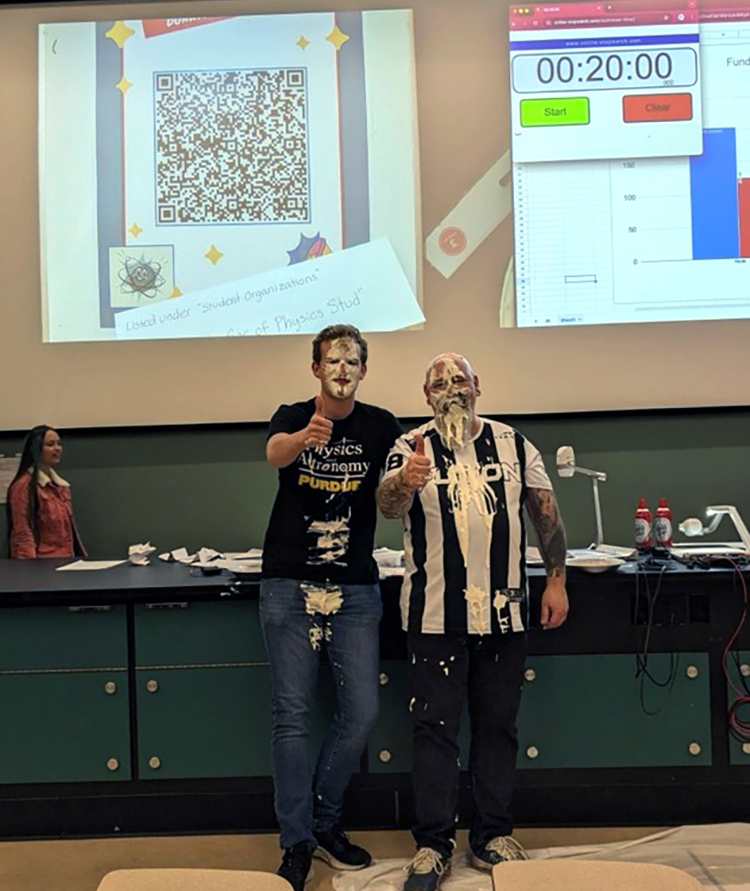
Mason Giacchetti and Professor Ritchie at one of SPS’s fundraisers. (Photo Courtesy/Ethan Pinarski)
Margineantu echoed that sentiment, encouraging students to stop by the SPS lounge and introduce themselves. "It might be scary at first, but don't hesitate to walk into the lounge to say hi or eat lunch. Everyone is very friendly and who knows, you might find yourself wanting a physics minor. (or major!)."
Getting involved in SPS is easy. As both Giacchetti and Margineantu said, students can stop by the SPS lounge in PHYS 236, attend an event, or join the club's Discord server after paying a small membership fee.
By becoming a member, students gain access to exclusive events, networking opportunities, and a strong support system. "Through access to our events, fellow members, and connections, you can learn about various opportunities to advance yourself professionally, and you can meet wonderful people who can help you navigate the difficulties of the college environment in physics or otherwise," says Giacchetti.
SPS is always striving to grow and improve. From the student's first year at Purdue to the last, the Purdue Society of Physics Students continues to be a cornerstone of the Purdue physics community, proving that science is best explored together.
“We found our interests being represented through physics and in an inclusive environment. When people think of a physics club, they may think of a stereotype where members are only doing physics problems together and that you must be good at physics to feel like part of the group. That’s what SPS explicitly tries to avoid,” says Bell. “We’re always open to new faces, and we’d love to see you joining in club events or gatherings, even if it’s just to test the waters and see if you like it. Everyone in SPS has been at that stage before and understands it can be daunting to engage with a new group. Though most of our members are physics majors, everyone has interests outside of physics that are frequently a focus of discussions and events, and I think there’s something for everyone here.”
Margineantu says, "Sometimes it can feel like the physics community is small on campus. This can feel isolating and unmotivating, but SPS is there to help everyone feel that they are not alone. SPS is a place of understanding because we all go through very similar things as physic majors. Whether it is trying to look for research opportunities or struggling with linear algebra, someone has gone through it before who can give you advice. This is how the support and community of SPS is built. I think SPS is always looking to get more people involved and to try out some new types of events. I hope to continue being an avid member and provide support to anyone who joins in the upcoming years."